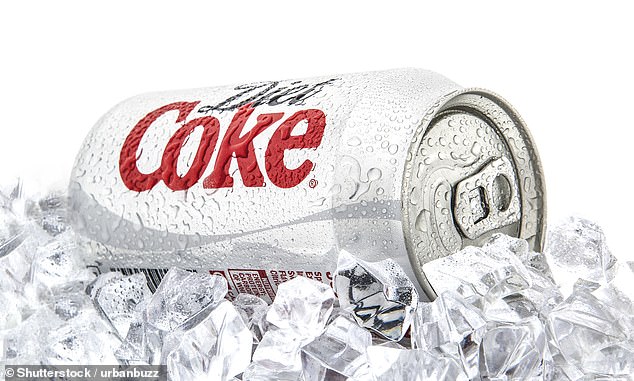An artificial sweetener commonly added to soft drinks may actually be increasing food cravings and make people eat more, a study claims.
Diet drinks are often used by people seeking to lose weight who want a ‘healthier’ way of satisfying their sweet tooth.
But scientists believe the sweeteners may trick people’s brains into feeling hungry, leading them to consume more calories.
Researchers at the University of Southern California tested the impact of sucralose on 74 volunteers.
The low-calorie sweetener is one of several used in the UK, others include aspartame which is used in drinks such as Diet Coke.

Researchers at the University of Southern California tested the impact of sucralose on 74 volunteers. The low-calorie sweetener is one of several used in the UK, others include aspartame which is used in drinks such as Diet Coke
In the new study participants were split into equal numbers of men and women, who were classed as being of healthy weight, overweight, or obese.
They were all asked to drink 300ml of different fluids on three separate occasions.
On one occasion the fluid was a drink sweetened with standard sugar, and another contained a substitute
The final type of fluid was water, which was tested as control for the experiment.
The researchers then measured three appetite responses among participants over the following two hours.
What does the NHS say about artificial sweeteners?
Sucralose is one of several artificial sweeteners approved for use in the UK.
Dietitian Emma Carder states: ‘Research into sweeteners shows they’re perfectly safe to eat or drink on a daily basis as part of a healthy diet.
She also says they’re a really useful alternative for people with diabetes who need to watch their blood sugar levels while still enjoying their favourite foods.
‘Like sugar, sweeteners provide a sweet taste, but what sets them apart is that, after consumption, they do not increase blood sugar levels,’ she says.
It’s been suggested that the use of artificial sweeteners may have a stimulating effect on appetite and, therefore, may play a role in weight gain and obesity.
But research into sweeteners and appetite stimulation is inconsistent. Also, there’s little evidence from longer term studies to show that sweeteners cause weight gain.
Source: NHS
Advertisement
They used a MRI to see how participants’ brains responded to images of high calorie foods such as burgers and donuts.
They also took blood samples to measure the levels of hormones related to appetite among the participants.
And academics also observed how much food people consumed at a complimentary snack buffet provided at the end of the each experiment session.
The results of the brain imaging experiments showed woman and obese people had increased food cravings after consuming drinks with artificial sweeteners, compared to drinks containing the real sugar.
The study also recorded a decrease in the body’s appetite regulating hormones in all participants after they consumed artificial sweeteners, compared to real sugar.
Observations of what volunteers ate from the buffet also showed women consumed more food after drinking the artificial sweetener, compared to sugar.
But men did not, according to the results of the paper which was published in JAMA Network Open.
However, the authors say the snack bar observations should be treated with caution because participants were asked to fast the night before the study. This meant they were likely more hungry than usual.
Lead author Dr Kathleen Page said exploring the impact of artificial sweeteners was important because many people used them as a weight loss aid.
‘There is controversy surrounding the use of artificial sweeteners because a lot of people are using them for weight loss,’ she said.
According to the study more than 40 per cent of adults in the US currently use artificial sweeteners as a calorie-free way to satisfy their sweet tooth, and/or as a method for weight loss.
In 2020, an estimated 2.2 million people in the UK used artificial sweeteners four times a day or more, according to market research company Statista.
But Dr Page said their research showed that substituting real sugar with artificial sweeteners could in fact lead some people to eating more food.
‘By studying different groups we were able to show that females and people with obesity may be more sensitive to artificial sweeteners,’ she said.
‘For these groups, drinking artificially sweetened drinks may trick the brain into feeling hungry, which may in turn result in more calories being consumed.’
Source link : https://www.dailymail.co.uk/health/article-10036535/Ditch-diet-Coke-youre-trying-lose-weight-Sweeteners-increase-food-cravings-study-claims.html











